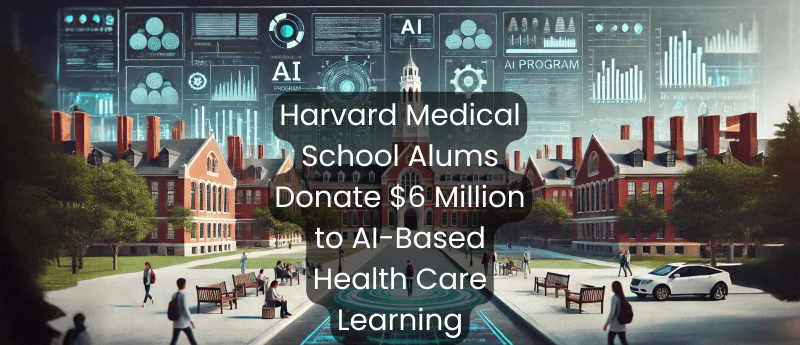Harvard Medical School Alums Donate $6 Million to AI-Based Health Care Learning

Harvard Medical School (MA, U.S.) has announced a $6 million donation from the Dunleavy Foundation to support educational programs aimed at enhancing medicine with AI.
The Dunleavy Fund for Clinical AI, led by two HMS alums, will be invested in educational purposes to equip the next generation of healthcare professionals with the skills and knowledge needed to harness AI technologies in clinical settings.
A New Generation of AI-Driven Healthcare Innovators
The Dunleavy Fund for Clinical AI, spearheaded by HMS alums Keith R. Dunleavy – CEO of Inovalon– and Katherine K. Dunleavy, consists of a $1 million grant and a $5 million donation. The funds will be allocated to providing educational opportunities for graduate and undergraduate students, as well as postdoctoral researchers, through internships, fellowships, events, programs, and research dissemination.
“To remain at the forefront of medical education, HMS must anticipate the physician of the future, practising in an environment rich with cognitive support resources powered by artificial intelligence tools. The time to invest in building a pipeline of AI experts for health care is now.”
George Q. Daley, HMS Dean.
A key initiative supported by the fund is the Artificial Intelligence in Medicine (AIM) PhD track, which launched its first cohort in 2024 and belongs to the Biomedical Informatics division, which combines the study of biology, medicine, data science, computer science, and mathematics to develop innovative solutions to process biomedical data.
As Isaac Kohane, head of Zak lab and the Marion V. Nelson Professor and head of the Department of Biomedical Informatics (DBMI) in the Blavatnik Institute at HMS, explains:
“The AIM PhD track is focused on recruiting young students right out of college who have strong training in quantitative disciplines like computer science, engineering, or mathematics and who have a demonstrated interest in biology, medicine, and contributing to effective improvements in clinical care.”
By focusing on recruiting students with this profile, the program is cultivating a new generation of researchers who are uniquely equipped to drive innovation at the intersection of AI and healthcare.
Additionally, the Dunleavy Fund aids the DBMI in creating talent development initiatives to introduce young scientists to AI in healthcare. One of these initiatives is a hackathon, where undergraduate students will be given access to clinical data, allowing them to investigate areas of focus and devise novel solutions.
How the Initiative Could Transform Healthcare
By integrating AI into the training of medical professionals, the Dunleavy Foundation initiative has the potential to enhance decision-making processes, reduce human error, and provide personalized care on a large scale.
Since AI can analyze vast amounts of medical data—such as imaging data, lab results, and patient histories — AI-assisted decision-making in medicine has the potential to enable healthcare professionals to make more precise, evidence-based decisions, that improve diagnostic accuracy and treatment plans.
Furthermore, by incorporating AI into clinical education, medical trainees will be prepared to work in an increasingly digitalized healthcare environment. Many tech giants including Microsoft, Google and Amazon are already focused on developing technologies to enhance healthcare practices. This initiative could also help reduce the administrative burden on healthcare providers, much like Amazon’s AWS HealthScribe and Suki’s scribing services, which have recently been adopted by Zoom. These tools would allow them to focus more on direct patient care and less on time-consuming paperwork.
Potential Pitfalls
While the Dunleavy Fund for Clinical AI holds great potential to transform healthcare, there are significant concerns that need addressing.
One of these concerns is the risk of over-reliance on AI systems. AI depends on the data it’s trained on, and if that data is flawed, incomplete, or biased, it can lead to incorrect diagnoses or treatment recommendations. As the initiative focuses on training the next generation of healthcare professionals, it’s crucial that students are equipped to recognize and address these biases in clinical AI tools.
Additionally, since human-to-human interaction is seen as crucial to sustaining efficient healthcare, depending too much on technology in medicine might dehumanize interactions between doctors and patients.
Furthermore, some AI tools currently used in healthcare raise concerns regarding their clinical validations, and some tools like the transcription tool Whisper have been deemed to be inaccurate at transcribing doctor-patient interaction, potentially putting patients at risk. Moreover, AI-powered devices require access to large and small datasets that contain sensitive patient data in order to operate properly. At times, patients are unaware of how their private information is being utilized, which raises concerns about patient privacy and AI trust. Without clear policies on data privacy and informed consent, the Dunleavy initiative risks undermining patient confidence in these emerging technologies.
Therefore, while AI has the potential to enhance medical practice and improve patient care, further efforts need to be approached with caution until the risks associated with bias, accountability, and patient trust are addressed.